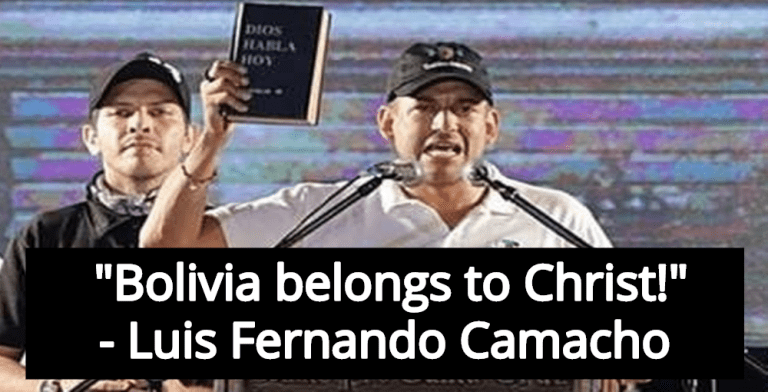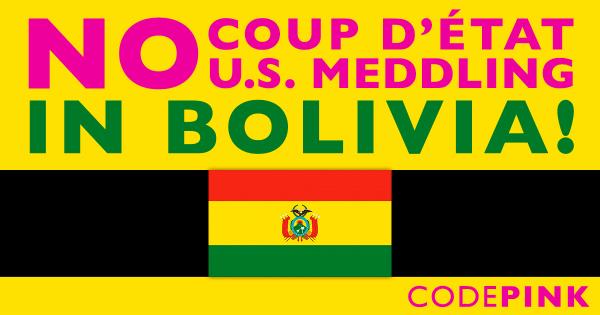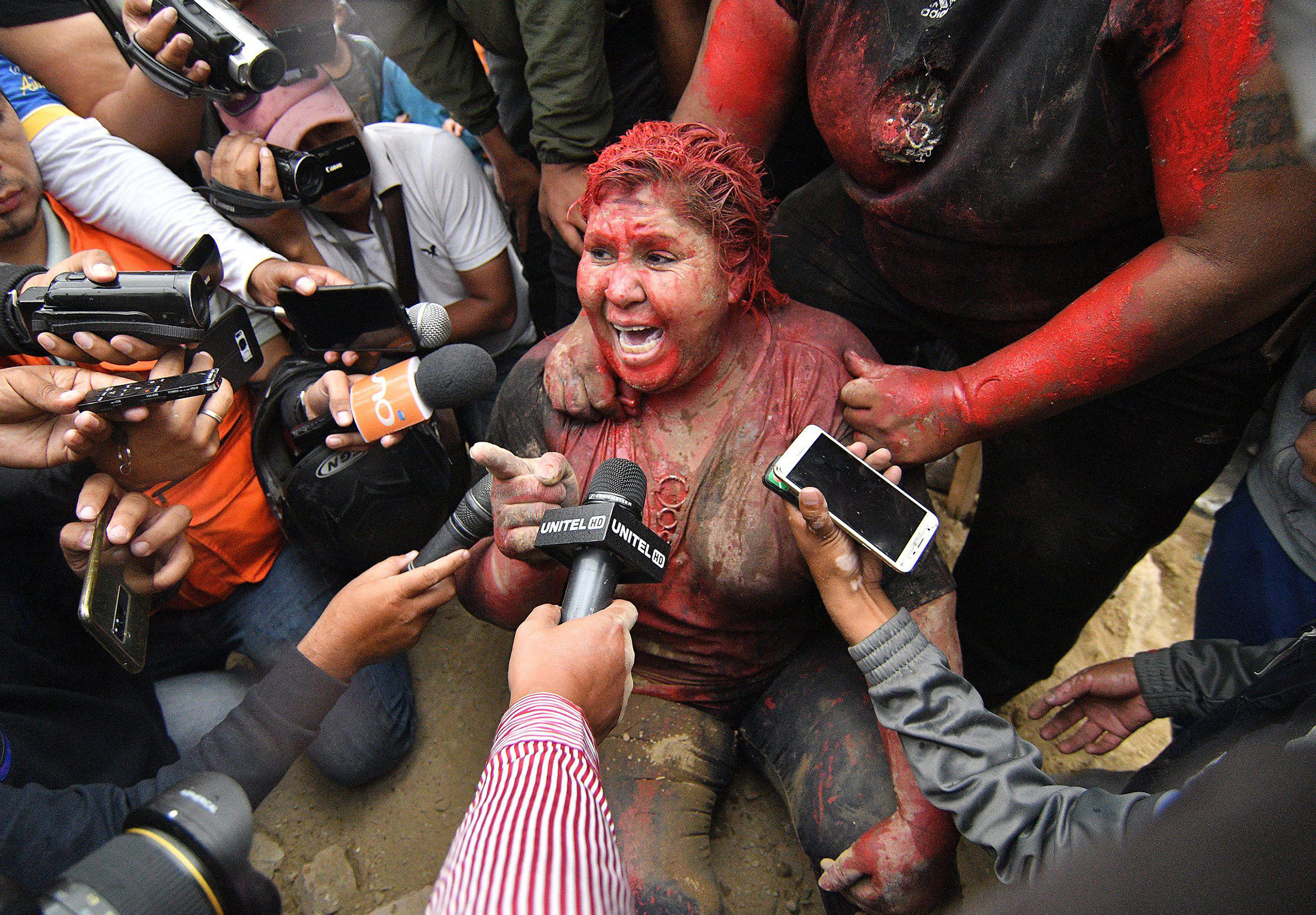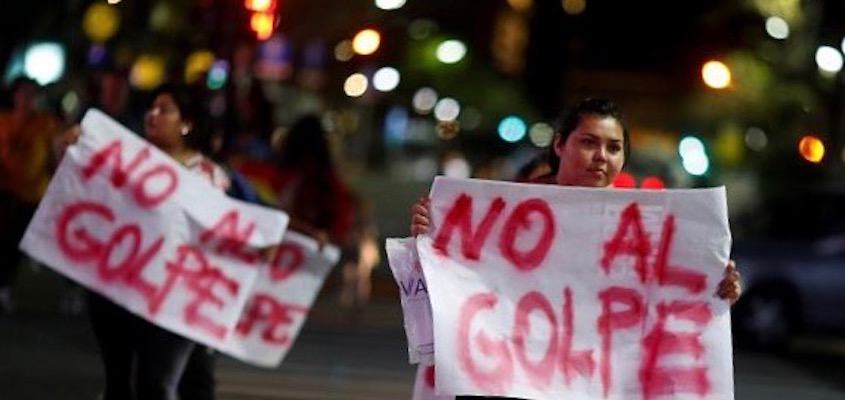I’m in Bolivia: Why Isn’t the United Nations?
(November 19, 2019) — For the past week, I have been in Bolivia. I came at the request of local activists who are panicked about the situation in their country, afraid that things are spiraling out of control. They are engaging in peaceful protests to reverse the coup that happened November 10th, but the protests have been met with tear gas and even live ammunition.
Unfortunately, mainstream media and even some progressive outlets are refusing to recognize that what happened a week ago was a coup and are not covering the coup regime’s racism and violence. Already, 24 protesters have been killed and nearly 600 have been wounded; hundreds more have been rounded up on jails, where the conditions are abysmal. People are appalled at t how racist and hateful the coup regime is.
On the same day that I arrived in Bolivia, Bachelet spoke out. “I am really concerned that the situation in Bolivia could spin out of control,” she said, while also voicing concern about the widespread arrests taking place. “This situation is not going to be resolved by force and repression,” she said. “All sectors have the right to make their voice heard — this is the basis for democracy.”
But if Bachelet really wants to be helpful, if she really wants to see the situation resolved and the people protected, why isn’t she here on the ground with me? Tell Bachelet to join me immediately. She should witness the situation with her own eyes.
I am on the streets alongside thousands of Bolivians — despite the coup regime’s violence — demanding the resignations of the coup regime and insisting on a return to democracy. However, the coup regime appears determined to hang onto power for as long as it can.
Coup leader and self-appointed interim president of Bolivia, Jeanine Añez, appointed a whole new cabinet and already begun changing Bolivia’s foreign policy, despite having no such mandate. The coup regime’s interim Interior Minister issued a decree exempting the country’s police and military from criminal charges that would otherwise arise as a result of their treatment of the protesters. It is terribly scary, but I am proud to be among the crowds of indigenous people marching for their country.
A month ago, Bolivia was a stable country with a growing economy and decreasing poverty and inequality. Now, chaos and violence have gripped the country, as racism and religious discrimination are rearing their ugly heads. The indigenous Wiphala flag has been ripped off government buildings and uniforms, while the coup regime brags about the supremacy of Christianity and the Bible over the Pachamama (the Andean goddess representing mother earth) and calls sacred indigenous traditions “satanic.”
ACTION: To draw more attention to this conflict we have launched a petition urgently asking the United Nations High Commissioner for Human Rights, Michelle Bachelet, to come here. Will you add your name? The people of Bolivia need the international community to come here to witness–and stop–the repression and slide to a police state. Please join me in telling UN Human Rights Chief Michelle Bachelet to join me here on the ground in Bolivia.
In solidarity with the Bolivian people,
Medea, and the entire CODEPINK Team.
NOTE: CODEPINK has drafted a press release, written an article, held a webinar, made a video and started a petition describing why the events in Bolivia should be called a coup. Please check these materials out and listen to me live on CODEPINK radio on Thursday, November 21 at 11 am EST and for a CODEPINK Facebook Live webinar on Wednesday, November 20 at 12 pm EST. I have also been livestreaming everyday.

Luis Fernando Camacho, one of the Christian fascists who helped lead the coup in Bolivia.
THE LETTER
On November 10, a coup in Bolivia led to the resignation under duress of President Evo Morales. This coup has been slowly carried out over three weeks, following the October 20 presidential elections that Morales won with 48% of the vote. Although there are concerns as to electoral irregularities affecting the margin of his victory, there is no doubt that Morales had a clear advantage over his closest rival. I am calling on Congress to investigate the coup in order to determine the extent to which the US government was involved in its planning or execution.
In response to claims of fraud, Morales invited the Organization of American States to conduct an audit. Hours before his forced resignation, Morales offered to replace electoral authorities and hold new elections in an effort to stem the violent protests and ensure peace in the country. This gesture was immediately rebuffed by the opposition leaders, who were clearly more interested in imposing an unelected government of their own, in defiance of the will of Bolivian voters.
The protests were ostensibly being held in response to the elections, but the fact that leaders refused to accept new elections makes it clear that their goal was to overthrow the elected government. Protestors burned the houses of government ministers and elected officials and trashed Morales’s home.
The brother of Victor Borda, the president of Bolivia’s lower house of parliament, was taken hostage — resulting in Borda’s resignation. There were also several troubling incidents of indigenous Bolivians being humiliated by opposition mobs. It should be noted that Bolivia’s population is majority indigenous and Evo Morales was the first indigenous president in the country’s history.
Congress should investigate the role played by the State Department and members of Congress in the Bolivian coup. The State Department has been actively opposing Evo Morales since 2001, when it sought to weaken his political base. This was five years before he was elected president. Since that time, the United States has funded President Morales’ political adversaries, including civic groups in eastern Bolivia that attempted a coup in 2008.
According to the International Federation for Human Rights, the opposition in eastern Bolivia “promoted separatism and ethnically and socially based hatred [in 2008] through the Civic Committees (Comités Civicos), in particular, the Pro-Santa Cruz Civic Committee.” The current president of the Pro-Santa Cruz Civic Committee is Luis Camacho, the leading coup figure.
Furthermore, Bolivian media uncovered audio files of conversations between Bolivian opposition leaders that detail their plans to cause social agitation before and after the October 20 elections. Senators Marco Rubio, Bob Menendez and Ted Cruz are mentioned in these conversations as supporting regime change in the country. Congress should fully investigate these claims.
At this point, it looks as though Bolivia will have a new election in the near future that should be monitored by an international body. Unfortunately, the OAS has lost credibility during this process, as it issued a misleading statement about the election and timed the release of a preliminary audit to coincide with demands made by coup leaders in Bolivia (the full audit was due on November 12 and there was little reason to issue a preliminary audit two days early other than to add fuel to the fire of the protests).
Congress should ensure that these elections are clean by asking the United Nations to send an electoral observation mission; it is the only global body with the legitimacy to carry out this mission.
Sincerely.

CODEPINK Condemns the Coup in Bolivia
November 10, 2019 — CODEPINK denounces the coup d’état in Bolivia that resulted in the resignation under duress of President Evo Morales. Bolivia has been rocked by violence over the past three weeks, as opposition protests raged under the pretext of alleged election irregularities, but which in hindsight look like a planned overthrow of the Bolivian government.
Early on Sunday, November 10, President Morales offered to replace the members of the electoral body and hold new elections in an effort to stem the violence and ensure peace in the country. This gesture was immediately rebuffed by opposition leaders, who are clearly more interested in imposing a government of their own rather than respecting the will of Bolivian voters.
Throughout the weekend, protestors burned houses of government ministers and elected officials. Victor Borda, the president of Bolivia’s lower house of parliament, resigned after his brother was taken hostage. Rather than stop the opposition violence, Bolivian police mutinied and the head of the armed forces suggested that President Morales resign.
The threats and lack of security have led to the resignations of several members of President Morales’ MAS party, including his cabinet and the president and vice president of the senate. As a result of these resignations, opposition Senator Jeanine Añez will assume the presidency on an interim basis.
The Organization of American States bears direct responsibility for helping to foment this coup. On October 21, the day after the presidential election, the OAS issued a statement criticizing the process, even though final results had yet to come in.
The OAS statement was thoroughly debunked by the Center for Economic and Policy Research, which later presented a statistical analysis of the results showing that the electoral results were well within the range of probability given all the information that had been released to date.
After being invited by President Morales to conduct an audit, the OAS issued a preliminary audit that claims to have found electoral irregularities. In response, President Morales called for new election — a call that the opposition dismissed. It should be noted that the full report was to be delivered on November 12; the preliminary report was released during an extremely tense time in Bolivia, one day after President Morales denounced that a coup was taking place.
The role of the United States also cannot be ignored. The State Department has been actively opposing Evo Morales since 2001, when it sought to weaken his political base. This was five years before he was elected president. Since that time, the United States has funded President Morales’ political adversaries, including civic groups in eastern Bolivia that attempted a coup in 2008.
According to the International Federation for Human Rights, the opposition in eastern Bolivia “promoted separatism and ethnically and socially based hatred [in 2008] through the Civic Committees (Comités Civicos), in particular the Pro-Santa Cruz Civic Committee.” The current president of the Pro-Santa Cruz Civic Committee is Luis Camacho, the leading coup figure.
As events continue to unfold in Bolivia, CODEPINK will be watching closely and we urge other organizations to do the same. The violence in Bolivia has a clear racial element to it, as the right-wing opposition is determined to push back the gains made by the country’s indigenous majority.

The mayor of Vinto, an Indigenous woman, was assualted and marched down the street while her home was set ablaze.
There have already been shocking attacks against indigenous leaders, including against the mayor of Vinto, who was dragged out of her office, beaten up, had her hair cut off, was drenched with red paint and was then marched down the street by protestors who burned down the mayor’s office. The opposition also entered and trashed President Morales’ home, burned down the houses of several cabinet ministers and took family members of elected officials hostage.
As of the drafting of this statement, the status of President Morales remains unknown. According to several sources, including the President himself, there is a warrant out for his arrest. CODEPINK joins the international community in demanding that the health, safety and rights of Evo Morales be guaranteed.
We call on the United Nations to denounce this military coup. US elected officials should not only denounce the coup, but also call for a congressional investigation to find out the extent to which the US government was involved.

The OAS and US Help Overthrow Another Government
Leonardo Flores
The United States and the Organization of American States can add another coup to their scorecards, even if US media refuses to recognize it as such. This time it was in Bolivia, where President Evo Morales was forced to step down on November 10, following weeks of pressure and extremist violence.
Morales resigned under duress, in order to avoid bloodshed, and emphasized that his “responsibility as an indigenous president of all Bolivians is to prevent the coup-mongers from persecuting my trade unionist brothers and sisters, abusing and kidnapping their families, burning the homes of governors, of legislators, of city councilors… to prevent them from continuing to harass and persecute my indigenous brothers and sisters and the leaders and authorities” of the MAS (Movement towards Socialism, Morales’ political party).
His resignation has yet to take effect, as it must be approved by the legislature. This did not stop opposition party member Jeanine Añez, the Senate’s second vice president, from declaring herself interim president, further proving that what’s happened is a coup. MAS legislators, who have a majority in both chambers, have been unable to attend parliamentary sessions as security forces have not guaranteed their safety.
Currently, indigenous and labor movements are on the streets in several Bolivian cities, demanding that President Morales be reinstated. Meanwhile, police forces are ripping the Wiphala flag (a flag that represents the indigenous peoples of the Andes) from their uniforms and from government buildings.
Coup leader Luis Camacho entered the government palace with a Bolivian flag and a bible; upon leaving, one of his supporters, a Christian pastor, declared that“Pachamama will never return to the palace… Bolivia belongs to Christ.” (Pachamama is an Andean goddess representing Mother Earth.) The coup and its aftermath are not just a rejection of President Morales, but of Bolivia’s indigenous majority and the social gains of the last 13 years.
Morales’ resignation came hours after the head of the armed forces and the chief of Bolivia’s police “suggested” that he resign. The head of the army, General Williams Kalimán Romero, was Bolivia’s military attaché in Washington from 2013 to 2016.
The chief of police, General Vladimir Calderón, was Bolivia’s police attaché in Washington until December 2018. As attachés they would have been in constant communication with the Pentagon and other agencies; it is no stretch of the imagination to wonder if they were still in contact with their US counterparts as the overthrow of the Morales government unfolded.
The coup was carried out over three weeks after the October 20 elections, but it was months, if not years in the making. The United States first began targeting Evo Morales in 2001 – five years before being elected president – when the US Embassy in La Paz warned that his political base needed to be weakened. Afterwards, USAID began funding right-wing political parties and “civil society” organizations that would feature heavily in attempts to overthrow President Morales.
The first such attempt came in 2008, two years after Morales was first elected president and days after he survived a recall referendum with 67.4% of the vote. On that occasion, coup plotters in eastern Bolivia, a region rich in minerals where the white minority population is concentrated, attempted to secede from the country.
According to the International Federation for Human Rights, the opposition in eastern Bolivia “promoted separatism and ethnically and socially based hatred through the Civic Committees (Comités Civicos), in particular the Pro-Santa Cruz Civic Committee.” Luis Camacho, the millionaire coup leader with ties to paramilitaries, is the current president of this committee, which has received US funding in the past.
The desire to overthrow Morales has existed for years, but more immediate plans were finalized in the weeks before the election. Bolivian media outlet Erbol published leaked audio of conversations held from October 8 and 10 between civic leaders, former military officials and opposition politicians who discussed “a plan for social unrest, before and after the general elections, with the aim of preventing President Evo Morales from remaining” in office. One opposition politician mentioned being in close contact with Senators Marco Rubio, Ted Cruz and Bob Menendez.
The OAS also played an important role in stoking protests and ensuring that the coup was successful. On October 21, a day after the election, it issued a statement casting doubt on the process due to an “inexplicable” change in the trend of the vote count. This statement was thoroughly debunked by the Center for Economic and Policy Research (CEPR), which found that trend did not change and that Morales widened the gap over his rivals due to late reporting rural precincts, where he enjoys a tremendous advantage.
A later statistical analysis by CEPR found that there was “no evidence that the election results were affected by irregularities or fraud.” However, the damage was done: protestors took to the streets decrying electoral fraud. These claims were echoed by the State Department and Senator Rubio on Twitter.
After being invited by President Morales to conduct an audit, the results of which he promised to respect, the OAS instead opted to destabilize the country. The full electoral audit was initially due by November 12, but on November 10, a day after Morales announced that a coup was taking place and amid political violence throughout the country, the OAS decided to issue a preliminary audit.
This report, which did not include data that could be independently verified, repeated the false claims of the October 21 statement and called for new elections. In response, Morales agreed to new elections and to replacing the board of the electoral body, yet this offer was rebuffed by coup leaders.
Rather than denounce the coup and insist that Morales be allowed to finish out his term (which ends in January), the OAS held a vote that refused to call it a coup, although several countries dissented. Mexico criticized the OAS for being “surprisingly quiet” given the violation of constitutional order, while Uruguay condemned the body’s “double standard depending on antipathy or sympathy” for the government in question.
Earlier in the day, Argentinian president-elect Alberto Fernández said “what happened in Bolivia is a shame, the behavior of the OAS is shameful because the audit the OAS held is significant in its flimsiness and has conclusions that are absolutely manipulated.”
It should be noted that the 2008 coup was neutralized in part because of the role played by UNASUR, the Union of South American Nations. This regional bloc has been severely debilitated in recent years as a direct result of State Department pressure and the willingness of right-wing Southern American presidents to give up on long-term regional integration plans for short-term political benefits. The decline of UNASUR and CELAC (the Community of Latin America and Caribbean States — another target of the State Department), coupled with the OAS’s bias, leaves the region with no credible multilateral organization.
This is important, because the only way forward for Bolivia is to hold new elections, which will require independent electoral observation. Given that the OAS is unfit for such a role, the region should insist that the United Nations send an electoral mission. It is the only body that can carry this role out in an impartial manner.
Bolivia is at a flash point and measures have to be taken to reduce tensions. Its legislature must be allowed to function normally, which in practical terms means that the safety of MAS legislators and their families must be ensured.
A gesture for MAS supporters would be to reinstate the president and vice president of the Senate and the president of the Chamber of Deputies (should they desire to be reinstated); all three resigned under duress during the weekend of the coup. Only then can the legislature decide whether to accept Morales’ resignation.
Finally, the MAS presidential candidate, whoever that ends up being, needs to receive guarantees for their safety and assurances from the international community that a MAS victory will be respected.
Posted in accordance with Title 17, Section 107, US Code, for noncommercial, educational purposes.